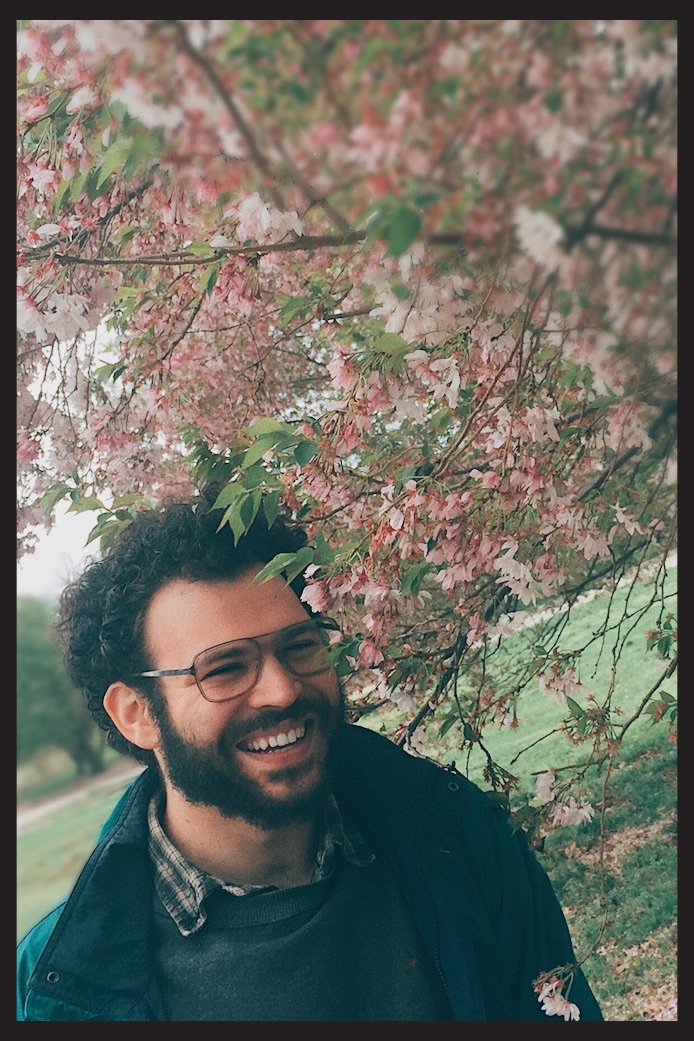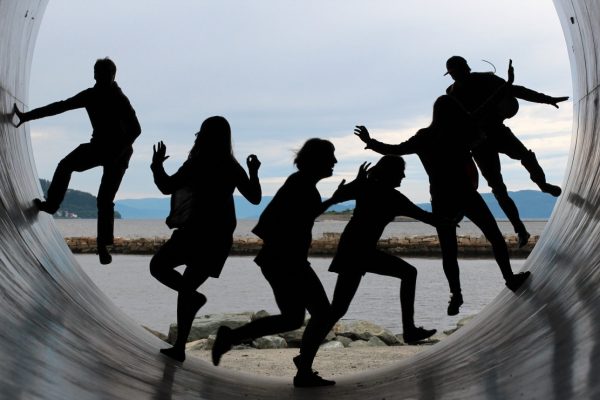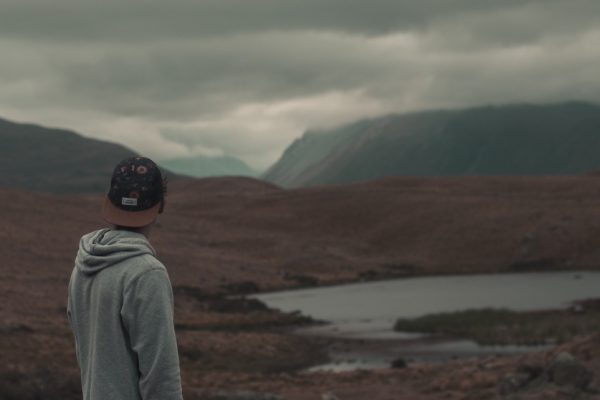This experimental immersive theater piece uses music, stage directions and pointed narration to craft a soundscape that engages the listener’s heart and mind.
Note from the creators: vandern is Yiddish for ‘to wander.’ I added the anglo suffix -ing to make it present progressive; present for both the tense of the verb and also present for the Yiddish language.
Transcript: Hi, I’m Logan. I’m the theater maker that created this spiritual practice, and I’ll be speaking with you through a fair bit of it. Before we begin, just, please remember that as we embark on this practice created specifically for transit, you have to first and foremost be fully alert while driving, so engage, but don’t get distracted from the primary task at hand. I ask that you allow this track to just permeate in the background, that’s how I wrote it to be experienced.
If you’re listening to this, that means you’re in some kind of vehicle driving down some kind of road. A road that is totally impossible to me. I’m recording this track potentially days, months, years before you’re hearing it, but as you hear it, you’re driving on a road that couldn’t be more concrete to you, its implications grave and essential. One that maybe passes businesses, advertisements, trees, tight spaces or wide expanses. All this while driving in an imperfect car, in and around other unknowably dangerous cars which to you are all too real. But to me, the road you ride is foreign, vague, ambiguous. It might as well not exist. I can try to imagine it, but it’s a bad collage of all of the public street side symbols I happen to remember right now. All this to say, it’s hard enough for me to imagine your physical surroundings, driving on government standardized roads, let alone how it feels to do that, or how it feels to be you doing that. and to do so with everything else you’re feeling today, about your friends, your family, your world. or more likely about yourself your personal experience. and so inevitably we’ve come to the most unimaginable thing: which is you. you and every other person driving around you right now. the multitude of interior lives outside ourselves, in yiddish we call this “ah nechtegen taug.” impossible like a nightly day. it is important we hold onto this sort of impossibility of knowing those both near and far, while simultaneously applying a constant pressure of empathy, or care and understanding, for all of these unknowns.
So let’s dive in: Act 1, Scene 1
Setting: In the car, in the year 2020, amidst a modern tragedy, where three quarters of a million people have died worldwide from the pandemic, and nearly two hundred thousand in the states. at the very same time, millions of human beings are being actively denied the right to healthcare and paid work, and hundreds of thousands protest violent and racist policing across the globe.
Characters: You, the traveler, and any other travelers who might be present in the car. They are listening to a heavily edited version of Im Hashem Lo Yivneh Bayis, the translated lyrics are: Unless the Lord Builds the House, the Builders labor in Vain. Unless the Lord watches over the city, the guards stand watch in Vain. Indeed the Lord who watches over the people, will neither slumber nor sleep.
Stage directions: The scene picks up in medias res, where the travelers have been experiencing the effects of ambiguous loss for sometime now. This is loss which is stimulated by a neglectful government ruled by an amoral elite in service to only themselves. Ecclesiastes says “a rich fool will be treated like a lord.” We are all experiencing loss on a scale that is personal, that is national, that is planetary.
But yet, the travelers must travel, because they are alive, and the living have things to do.
Whether or not the travelers ride in the car alone or together, they feel that, despite whatever kinship they may share, they are each alone. They feel alone because of being in a car on a road shared by thousands of human beings every second. People they will never know, meet, or care about. Alone because they are separated by thin aluminum, glass, reflective lines painted on the asphalt by a guy at around quarter to three in the morning, and the varying degrees of deliberate caution stressed by every adjacent driver, and your deliberate caution too. Alone because of the constant cycles of social media, of news, of violence, of hate, of assholes on the road. Alone because of our shame.
One of the travelers picks up a copy of Herman Hesse’s Wandering, cracks it open and reads aloud:
I hear trees rustling in the wind at evening. If one listens to them silently for a long time, this longing revelas its kernel. Its meaning. It is not so much a matter of escaping from your suffering, though it may seem to be so. It is a longing for home, for a memory of the mother, for new metaphors for life. It leads home. Every path leads homeward, every step is birth, every step is death. Every grave is mother. And in the margin of the page a scrawled note read, “Every next step as generative.” (Hesse, Hermann. Trans. James Wright. Wandering. Farrar, Strauss, and Giroux, Inc. [United States].)
They close the book.
When Rebekah and Isaac opened the door to Abraham’s room, they found him dead. Isaac kissed him dearly as he wept. Mourn for the dead who will never be kissed goodbye, and more importantly remember them. Rejoice that you can still kiss, that you are alive, and that all of these travelers driving like hell around you are alive too, to kiss and to be kissed. Mourn for the dead who will never be kissed goodbye, and more importantly remember them. Do not forget that being alive is to be at once full of grief and busyness and annoyance and joy. Despite yearning for catharsis, we actually just need a little time for contemplation. And so you are driving.
The curtain rises.
 Logan Gabriel Schulman (they/them) is a queer visual and performance artist, director, cultural educator, and activist. Their work unfolds as ritual collage, complicating common visions of faith in America. Through performance, installation, and video, their practice weaves empathy, criticality, and wonder into reflexive multimedia narratives. Logan has created work for the Toronto-based Italian experimentalist theater DopoLavoro Teatrale, University of Pennsylvania, Enya Kalia Creations, Renegade Theater, the Chautauqua Institution, ReVamp Collective, and the Estate of Historic Spanish Point, among others. They earned their Bachelors with Honors in Theater and Religion from New College of Florida. Their work has been supported in residencies and grants from the Andrew W. Mellon Foundation, the Florida Humanities Council, Bread & Puppet Theater, the School of Visual Art at Chautauqua Institution, Stella Adler Studio, New College of Florida, Headlong Dance Theater, Philadelphia Directors Gathering, Directors Lab North (Toronto) and Directors Lab West (LA).
Logan Gabriel Schulman (they/them) is a queer visual and performance artist, director, cultural educator, and activist. Their work unfolds as ritual collage, complicating common visions of faith in America. Through performance, installation, and video, their practice weaves empathy, criticality, and wonder into reflexive multimedia narratives. Logan has created work for the Toronto-based Italian experimentalist theater DopoLavoro Teatrale, University of Pennsylvania, Enya Kalia Creations, Renegade Theater, the Chautauqua Institution, ReVamp Collective, and the Estate of Historic Spanish Point, among others. They earned their Bachelors with Honors in Theater and Religion from New College of Florida. Their work has been supported in residencies and grants from the Andrew W. Mellon Foundation, the Florida Humanities Council, Bread & Puppet Theater, the School of Visual Art at Chautauqua Institution, Stella Adler Studio, New College of Florida, Headlong Dance Theater, Philadelphia Directors Gathering, Directors Lab North (Toronto) and Directors Lab West (LA).











